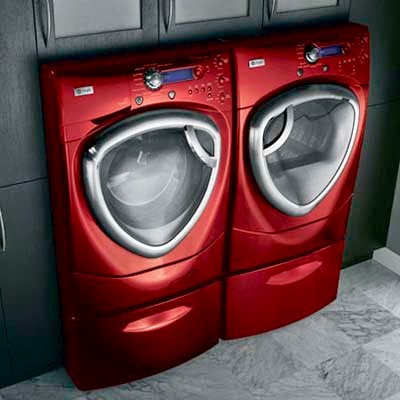Replace failing caulk and cracked tiles to discourage mold from growing behind the walls. For how-to advice on fixing both.
Dehumidify. Run your ceiling vent fan after every shower. Install a switch timer to make sure it runs at least 20 minutes to vent moist, mildew-attracting air outside.
Avoid using cleansers with ammonia and chlorine (and never, ever mix them). These irritate skin and lungs, and even provoke asthma.
Sanitize faucets, where germs and flu viruses collect fast. Wipe them down with a 3 percent hydrogen peroxide solution or try wipes that use plant oils to kill germs and viruses, such as EPA-certified Seventh Generation Disinfecting Wipes ($5.75; seventhgeneration.com).
Swap out vinyl shower curtains for washable nylon or polyester ones. Vinyl can contain phthalates, which may be hazardous to reproductive health. Similar to shown here: Nylon Hotel Shower Curtain ($20; restorationhardware.com).
Avoid chemical grout cleaners. Make a paste of baking soda and hydrogen peroxide instead, and let it sit on grout for 30 minutes before scrubbing and rinsing.
Install a whole-house water filter to reduce exposure to airborne chlorine while you're showering. Or try a filtered showerhead, such as Aquasana's Shower Filtration System ($85; aquasana.com).
Vacuum, dust, and damp-mop regularly. This will wipe out dust bunnies that can carry flame-retardant residue from electronic equipment, carpet backing, foam rubber, and other furnishings. Kids are especially vulnerable because they play on the floor.
Test suspect paint surfaces for lead. This known neurotoxin can be released into the air when paint chips or peels, and is present in paints made before 1978. Newer, more reliable test kits, such as the LeadCheck Household Lead Test Kit, can evaluate most light and dark colors ($19 for eight swabs; leadcheck.com). If you suspect toys of having lead paint, check the list of recalls at recalls.gov.
Sanitize doorknobs and toys, which can harbor germs for 48 hours. Small items can be treated with a handheld germ blaster, such as Verilux's CleanWave UV-C Sanitizing Wand ($90; verilux.com).
Install linoleum, cork, tile, wood, or stone in place of carpets and vinyl flooring. Unlike vinyl, these natural materials contain no phthalates, and linoleum inhibits bacterial growth. All collect less dust than carpeting does. Shown at left: Marmoleum Click linoleum tiles ($7-$9 per square foot; forboflooringna.com).
Look for chemical-free furnishings filled with batting made from natural fibers, and pressed-wood furniture and cabinets made with little or no formaldehyde.
Avoid furnishings and clothing with stain-resistant coatings that contain perfluorochemicals. Questions have been raised about their safety.
Upgrade to a steam washer. Look for an NSF-certified model able to zap germs and allergens with high-temperature steam heat.

No comments:
Post a Comment